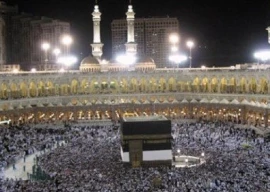
The commission termed the situation as a threat to the rights of citizens and their religious freedom.
In a statement issued by Chairman HRCP Zohra Yusuf on Sunday at the conclusion of an HRCP council meeting, the commission said that, “The Human Rights Commission of Pakistan is disappointed at the continued enforced disappearances and illegal detention across the country, especially in Balochistan and K-P. This endemic malaise has proliferated in conjunction with the plague-like spread of sectarian violence in Pakistan, which is both widespread and systematic.”
It added that it was concerned for the growing intolerance and extremism in the country, which was affecting all aspects of life including education and judiciary, since this was fueling religiosity in state institutions too.
Referring to a recent court order in a case where an alleged brothel owner’s bail was made conditional to her spending an hour at a madrassadaily for a month, the HRCP said it had no basis in law and that such precedents should be singled out and condemned.
Regarding the blasphemy law, the commission said that the law was being abused to persecute religious minorities and should be exposed.
The commission called upon authorities to dismantle all sectarian organisations that had links with militant elements and ban the latter.
It also emphasised on giving due priority to the investigation and prosecution of cases related to sectarian violence.
Free and fair elections
Talking about upcoming general elections, the HRCP said that the future of democracy and state’s integrity depended on free and fair elections, adding that all political parties, media and civil society should play their role in aiding the Election Commission of Pakistan (ECP) in ensuring this.
It particularly emphasised on free and fair elections in Balochistan.
The commission lauded ECP’s decision on re-polling at stations where less than 10 per cent of the registered women voters cast their ballots, adding that the measure would increase women’s participation and prevent illegal pacts made by candidates and political parties to bar women from voting.
On Ahmadis, the commission reaffirmed its longstanding demand for an end to discrimination against the community and to ensure their inclusion in the joint voters’ list.
On capital punishment, the HRCP asked the government to fulfil its promise of converting capital punishment into life imprisonment.
Improve working conditions in industrial sector
In light of the recent fire tragedies in Karachi and Lahore, the rights body highlighted the dangerous work conditions in the industrial sector as well as the agriculture sector, adding that the attainment of profit clearly trumped safety and welfare of workers.
"It is unnerving how the authorities now take in their stride the general and pervasive breakdown in law and order across the country, which is denying the citizens of the whole gamut of rights, not least the right to life, but also the right to work and to education among many others," HRCP said.
"There are well founded fears that the situation will deteriorate further leading to and during the forthcoming elections. It is high time that the authorities respond to the omnipresent paralysis of law and order through well thought-out and concrete measures and not through mere rhetoric," it warned.
It noted with dismay the plight of flood survivors in Sindh and Balochistan continues to be compounded by a lack of government response.
The statement concluded that it expected the civil society and the media to actively play a more responsible role as watchdogs for people’s rights and in continuously reminding the authorities of their obligation towards all human rights of all citizens without exception.
COMMENTS (1)
Comments are moderated and generally will be posted if they are on-topic and not abusive.
For more information, please see our Comments FAQ

1730360426-0/Menendez-Brothers-(2)1730360426-0-165x106.webp)
1732534556-0/taylor-(14)1732534556-0-165x106.webp)
1725872216-0/Tribune-Pic-(3)1725872216-0-165x106.webp)
1732532771-0/BeFunky-collage-(89)1732532771-0-165x106.webp)

1732530440-5/Copy-of-Untitled-(85)1732530440-5-270x192.webp)

1732534225-0/Express-Tribune-(13)1732534225-0-270x192.webp)








The worst thing that happen to Pakistan was that it continues its fall from a secular state meant to protect the rights of Muslims along with others to have created a Islamo-fascist state thanks to Zia, house of corrupt Saud and other mullahs and wahabi nut cases. Until we change that we will continue in this downward slide to the abyss of anarchy and all that a failed state brings.